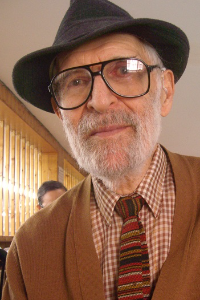


Irving Leonard Kessler, lifelong New Yorker, veteran, and political progressive, died of complications of congestive heart failure at the Lafayette Facility in Marblehead shortly before dawn on New Year’s Day. A passionate peace advocate, he downplayed his World War II experiences serving in the 104th Infantry Division, service that included winning both a Silver Star as a medic for rescuing wounded soldiers under a hail of machine gun fire and, later, a Purple Heart after being shot through the leg in Belgium.
Irving, the son of Harry Kessler and Fannie Gilman Kessler, grew up in Williamsburg, Brooklyn, attending Eastern District High School and City College of New York. After the war he entered his father’s textile business, Alpine Lining, eventually becoming proprietor. He fathered three children with his first wife, Estelle (Deidre) Rosenfeld, and of these two survived him, David of Berkeley, California, and Rod of Salem, Massachusetts. He is also survived by his grandson, Martin Kessler, his daughters-in-law Nancy Mennel and Maile Black, and many loving nieces and nephews. His second wife, Lorraine Hoffman, made him a widower, as did his last wife, Julieta Viera, whom he tended to lovingly through her last troubled years dying of Alzheimer’s.
After his 98th birthday, when his medical problems, his hearing loss, and his near blindness made living alone in his Queens apartment untenable, he agreed to move into nursing care in Massachusetts, near his son and daughter-in-law in Salem. To the end he insisted on having daily home delivery of the New York Times.
A true Communist, Irving visited Cuba and believed that Castro’s revolution had improved the healthcare, welfare, and education of the great majority of Cuban people. In New York, he stood at peace vigils, protesting U.S. capitalist interventions in the Third World. He championed integration and was in the audience for Martin Luther King’s “I Have a Dream” speech. He attributed his longevity to his vegan diet. He loved chamber music so dearly that he claimed he could play and enjoy his favorite pieces from memory in his mind.